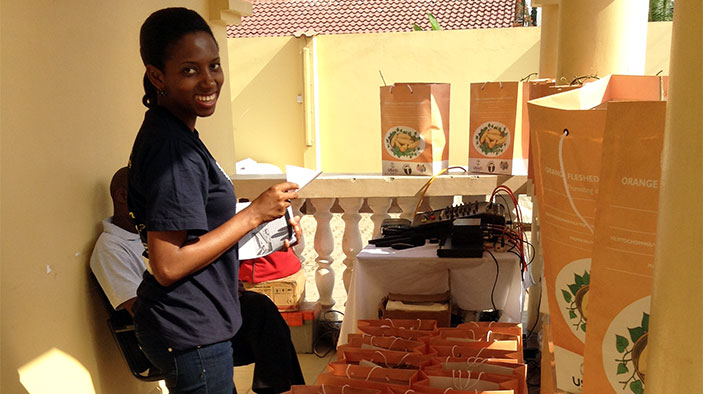DAI Project Hosts Harvest Learning Event in Tanzania
July 22, 2013
The DAI-led Economic Strengthening for Households Affected by AIDS (IMARISHA) project—in partnership with four other organizations—recently hosted the Orange Fleshed Sweet Potato Harvest Event. The event brought together the expertise of programs supported by the President’s Emergency Plan for AIDS Relief (PEPFAR), the U.S. government’s Feed the Future Agriculture Initiative, and the Bill and Melinda Gates Foundation.

U.S. Agency for International Development (USAID) Tanzania Mission Director Sharon Cromer was one of three speakers who emphasized the importance of the vitamin A-rich vegetable in the fight against malnutrition, food, and economic insecurity in Tanzania.
In Tanzania, 33 percent of children under the age of 5 and 37 percent of women aged 15-19 suffer from vitamin A deficiency. Vitamin A deficiency results in health issues including blindness, weakened immune system, and an increased risk of miscarriage, premature birth and death among pregnant women. The orange-fleshed sweet potato offers vulnerable households a nutritious, cost-effective alternative.
“Given that orange-fleshed sweet potatoes can be grown throughout Tanzania and they are not labor intensive, they are an ideal crop for vulnerable households that may have limited time, money for investment, productive capacity, or ability to manage other crops,” Cromer said.
Since 2011, USAID-funded IMARISHA has supported Tanzanian organizations, communities, and national and local governments to implement programming on economic strengthening, livelihoods, and food security-linked services that improve the economic well-being of vulnerable households, particularly those affected by HIV. Since last year the IMARISHA team has been working with partners to promote the production and processing of orange-flesh sweet potato to improve food security of vulnerable households, the first critical step in moving up the livelihood pathway away from poverty.
Participants, which included representatives of Dar es Salaam-based organizations that work with vulnerable populations and local government authorities, learned how to plant, harvest, and store potato vines, as well as how to multiply vines and keep them free of pests using natural pesticides. There were also demonstrations on how process sweet potatoes for consumption in juice using local Swahili recipes and how to process sweet potatoes using a low-cost solar dryer developed by IMARISHA grantee, Cheetah Development.
The event brought organizations working on HIV, agriculture, nutrition, and economic growth. Collaborating and working together across interests and investing in orange-fleshed sweet potatoes can leverage health and wealth benefits for Tanzanians and increased impact for development programming.
RELATED CONTENT:
DAI’s Nitish Debnath Appointed to One Health High-Level Expert Panel on Zoonotic Diseases
Dr. Nitish Chandra Debnath, DAI’s Country Team Lead for the Fleming Fund Bangladesh program, is one of 26 global experts selected to serve on an expert panel convened to advise leading global health agencies on the development of a plan to avert disease outbreaks with the potential to trigger pandemics.
Read More